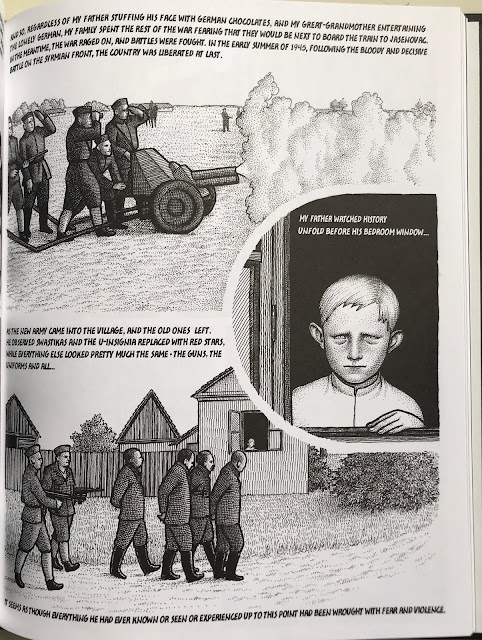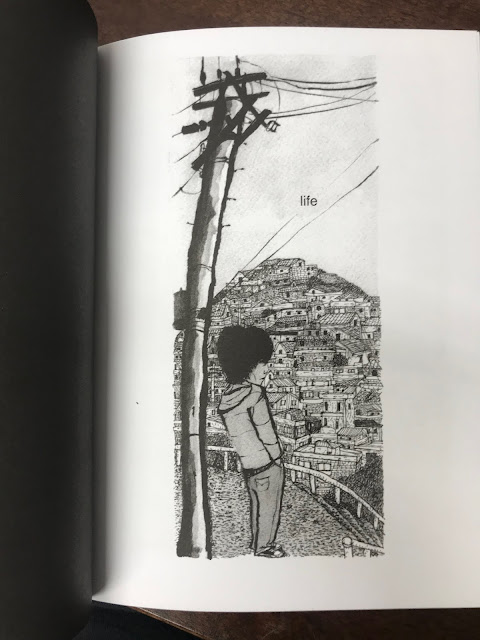Sick, by Gabby Schulz
2016
Just last month, I read Monsters, by Gabby Schulz, aka Ken Dahl, and was quite impressed. I've subscribed to his Instagram and picked up another of his books, Sick. Now, Monsters was about life with herpes and festering genitals. Sick couldn't possibly be more troubling to read, could it?
 |
| The cover and the insides as well are lushly grotesque |
Then the second half was about humanity and what a blight on existence we all are. The thing is, it was told from a distinctly American perspective, one wrapped up in race, religion and economic inequalities, and I wasn't on board with that because it just isn't the world I live in, as a Canadian living in Japan for the past twenty years.
 |
| There are dozens of pages of shredded flesh |
The book looks great. It's an oversized hardcover, loaded with lush watercolor illustrations of sickness. It's beautiful in its grossness. He draws scenes and images over and over again, and gets into rhythms with them which are compelling to look at. He shifts from neutral side views to worms-eye views, and with some sequences in the bathtub, the view from down the drain. It's powerful stuff. |
| There's a lot of suffering |
More and more I hear about Americans who can't go to the hospital for the simplest things because it is just unreasonably expensive. It's tragic, and that's the way the country has chosen to go. I prefer Canada's free hospitals (paid through taxes of course), or even Japan's heavily subsidized insurance system to America's "better be rich or else" one. The notion of spending two weeks in bed, immobile and losing blood every time you use the washroom, yet not being able to go to the hospital is insane. It's not normal in the developed world, it's normal in America.  |
| He tackles his own difficulties in trying to be a person |
Schulz weighs his life, the ups and downs, the value of existence, and tries to find out if it's even worth living. At first, it's personal and compelling. He gets into his "complicity" as a white, able, sane, middle-class, cisgendered male, and despite being in the identical demographic, I started to look at him as opposed to relate to him.
He goes into talk about humanity, but it is so much about America, or at least Euro-centric. What he's writing is interesting, but he describes it in some universal way, when it isn't. Every country has its problems, but, as an outsider looking at America, America has more than average.
 |
| History is most definitely a dark thing, with countless stories of societies being horrible to other societies, Europeans often being the most horrible |
So as I read, I saw Schulz writing what he seemed to think was some grand truth. The world has problems, every place has problems, but what he's getting at is really a personal view of the world. Toward the end, he writes, "Maybe there are no words to describe what no one wants to hear." On the back cover, he writes, "Not recommended for the self-satisfied." I felt bad for him, because I've done the soul-searching and analysis of life, and my results weren't the same as his.
Our history, he states, is "primarily one of destruction, consumption and greed." History is most definitely full of destruction, consumption, and greed, but it's hard to say it's primarily so. I love the art of the world, I love the culture of the world. The negativity is part of it, but it's a miserable practice to focus on the negative and make it the foreground. It's simply part of the animal that is humanity.
 |
| A beautiful page. The one after this is bleak |
It's a good work, he's a talented creator taking himself to an honest place. The ideas in this at the very least force readers to confront their opinions on the world, whether in agreement or disagreement. If I had to compare it to another comic creator, the closest one would be Ivan Brunetti and the self-flagellating work he did in Schizo. But in that, Brunetti knew he was being over the top. Here, Schulz seems quite serious. The reality of their point of view could be very different. Perhaps Brunetti was serious, and his humor was a reflexive defense. Maybe Schulz is offering this up as food for thought and not a treatise to be taken so literally. I can't say. But the book portrays human life as a disease.
It is food for thought though. To read through this is to confront a lot of harsh ideas about humanity. Ultimately, I don't share Schulz's views and by the end, I was interacting with it as I might a book espousing Christianity or Islam or any other view of the world I have already investigated and rejected. I wasn't able to embrace his ideology, and that affected my ability to purely enjoy an ideological work like this.










































